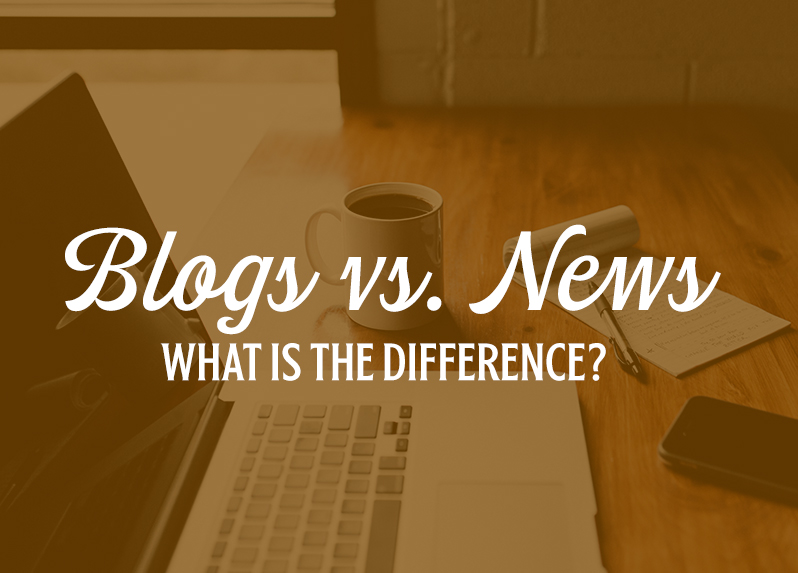
BLOGS VS. NEWS: WHAT’S THE DIFFERENCE?
So, you’re being told you should be writing blogs and news posts to keep your site relevant and ranked well, and totally lost on what to do and where to begin? Luckily, you’ve stumbled upon the right blog post! As a design and marketing agency, we must stay relevant and ranked well for SEO. How else would we be able to grow our business and show our clients that what we tell them to do to grow their business, actually works? Want to know the ins and outs of blogs, news, and keep your content relevant and fresh for your brand? Keep reading to find out how to plan your web content for your business.
First of all, what is the difference between a news section and a blog section?
Let’s break it down.
The News section of your site should be more factual.
Just like the news on TV or in the newspaper, you’re being fed content in a matter-of-fact manner. This style of writing should apply to your news section.
Sure, it may be a little more cut and dry, but it gets the point across to your readers with complete transparency, and without the extra fluff.
The tone for a news section could be characterized as:
- Official
- Serious
- Factual
- Honest
- Truthful
- Genuine
News posts are also typically to the shorter side. We recommend 300-800 words, but if your news post requires a lot of information, feel free to write more!
When Should I Write a News Post?
Company/Employee Announcements
Think about your company and your employees – is there anything new, interesting, or relevant you’d like to share on your website?
There are dozens of topics that could be relevant (all dependent on your specific company and industry). Here are a few ideas to get your gears turning:
Did an outstanding long-term employee just retire?
Write a news post describing who the person is, what their role was, and how they made an impact on the company over the last “x” number of years they were with the company.
Is your company offering a new service or product?
Write a news post announcing the new service or product, when it will be available, and all the features your readers will want to know.
Did your company recently expand into a new city?
Tell your readers! They’ll want to know more about your expansion, and the new location they can find you at.
Project Updates or Completions
Is your company working on an exciting new project?
Tell your readers about your progress! Explain all the details about what the project is, who is working on the project (internally at your own company, or if you’re working with another company), when the project is expected to be completed, or any special notes or hurdles your team will overcome in the process.
Also tell your reads when you’ve completed a project! Share photos, videos, and some information on the project process, how you made sure it was a success, and what you can learn from for your next project.
Award(s) or Achievement(s) Announcements
Did your brand recently win an exciting award, or reach a special milestone?
Write a news post about the award you won – it’s okay to brag a little everyone once in a while… after all, you did win something and deserve to show off that hard work pays off! It makes your brand look more established, trustworthy, and accomplished.
Upcoming Event Announcements
Is your brand hosting an upcoming event, or attending a trade show?
Tell your readers. Who knows, you may be able to meet some of your followers in-person and make some new connections or clients by letting them know where and how to find you!
Recent Event Reflection
If your brand recently hosted or attended an event (and didn’t have the opportunity to write a news post beforehand), you should still let your readers know what you did! Even if it’s after-the-fact, it’s always good to show that your company likes to meet new people, learn new things, and make a better connection with clients or other industry-experts. Give a reflection on the event: who went, what the event was, when it was, where it was, and what your team got out of the experience of attending.
Industry-Related Announcements
Sometimes, your news posts may be based on other events going on in the actual news – and that’s totally fine! You may find yourself referencing out to other sources, which again, it totally fine – as long as you make sure to link to your sources and give them the proper credit.
Need an example? Let’s say your business is in the food industry, and has multiple products already on shelves. New FDA regulations were published in the past year or so that announced new Nutrition Fact Panel rules that go into effect soon. This is something industry-related that not only you should be aware of, but you should touch upon in a news post for your readers to also be aware of. Next step? Do your research. Explain what the regulations are, while also citing your sources and sharing links to the official FDA site for more information for your readers. You would also explain that your company would be making sure to comply with the new regulations and customers can expect to see the new nutrition fact labels on products beginning in 2020.
So if the News section is strictly factual, what does a Blog post look like?
A Blog is written to sound more like a personal mentor giving you advice.
A blog allows you to write more freely about industry-related topics, where you can write from a more conversational approach.
The tone for a blog can be described as:
- Personal
- Opinion-based
- Advice-giving
- Conversational
- Analytical
- Engaging
- Casual
Though you don’t want to come across as too casual in your blog posts, you don’t want to sound like a robot either. Find a happy medium where you can still be informative, yet welcoming.
Additionally, we recommend blog posts to be around 1500 words. Yes, this is significantly more than our news post word count recommendation. However, the nature of blogs lends itself to lengthy topics. It allows you as a writer to craft a piece people will truly want to sit down and take the time to read and reflect upon.
When Should I Write a Blog Post?
Again, this is all depends on your company and the industry you’re involved in. Not sure what to write about, or need a few ideas to get the ball rolling?
You guessed it – we have a blog about blog topics! Check it out for yourself. Maybe something will give you the inspiration you need to get writing your first blog.
*** If you’re writing a blog and find yourself writing a novel, break your blog up into different parts. You don’t have to post all 3 parts of your blog at once. Publish each part once a week over a three week period. This will not only keep your blogs a more consistent length, but it will also allow you more time to start preparing your next blog topic.
Can they be combined into one section?
It depends! Generally at ocreations, we like to encourage our clients to have separate sections, with the hope that they will update their site on a regular basis. The more consistently you’re planning to post, the more likely you’ll need separate pages for blogs and news. However, if you’re running a small business by yourself and you don’t have the time to write a news or blog post weekly, you might be able to get away with combining into one page that is called Blog/News. This is not highly recommended, but can be done if you’re not able to write as frequently as Google would like you to. An alternative option if you don’t have the time to spend writing for your site consistently is to hire an agency (eh hem..) to write for you!
At ocreations, we offer packages for news/blogging to make sure your site stays up-to-date and relevant.
[“source=ocreations”]












